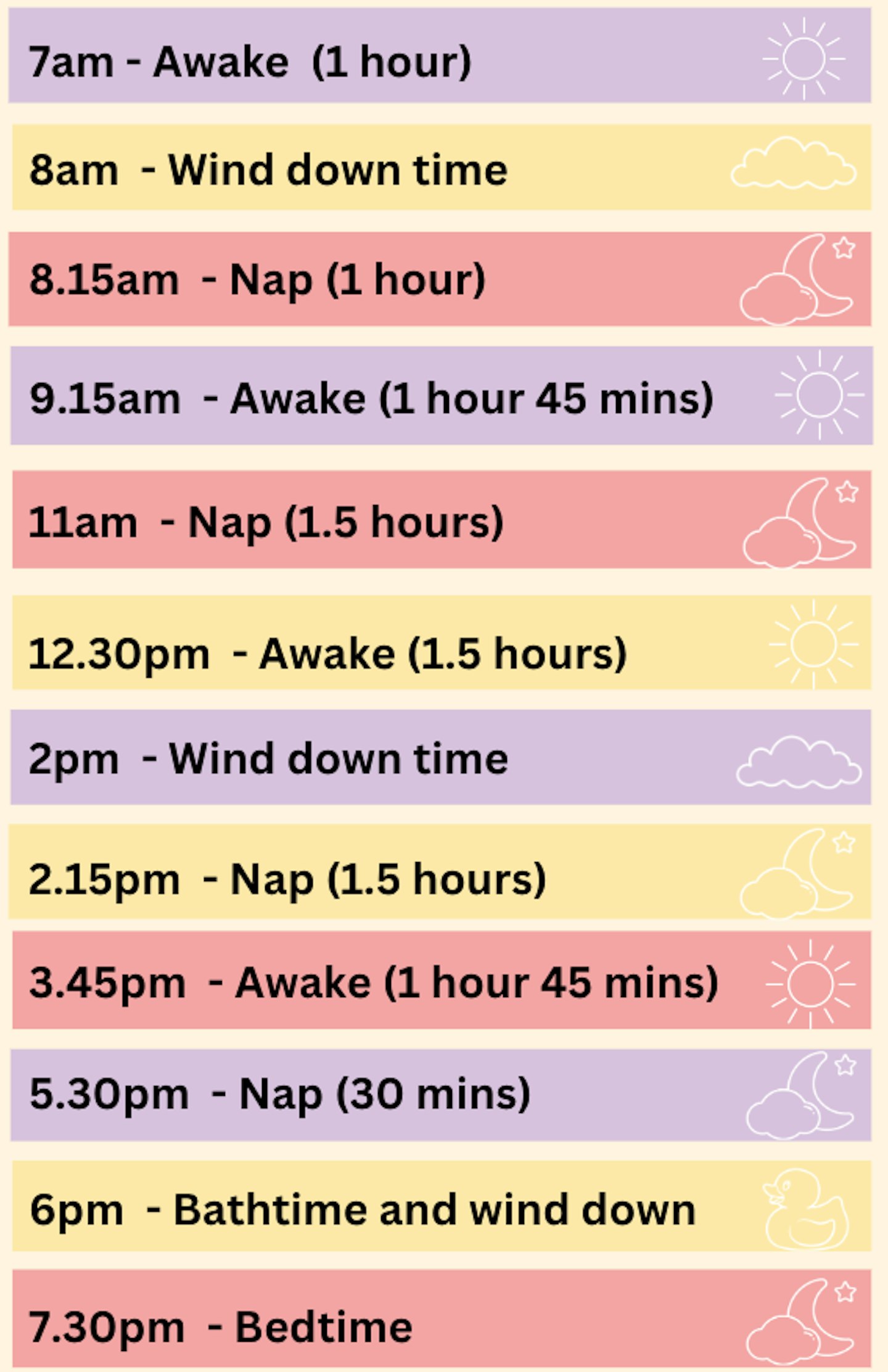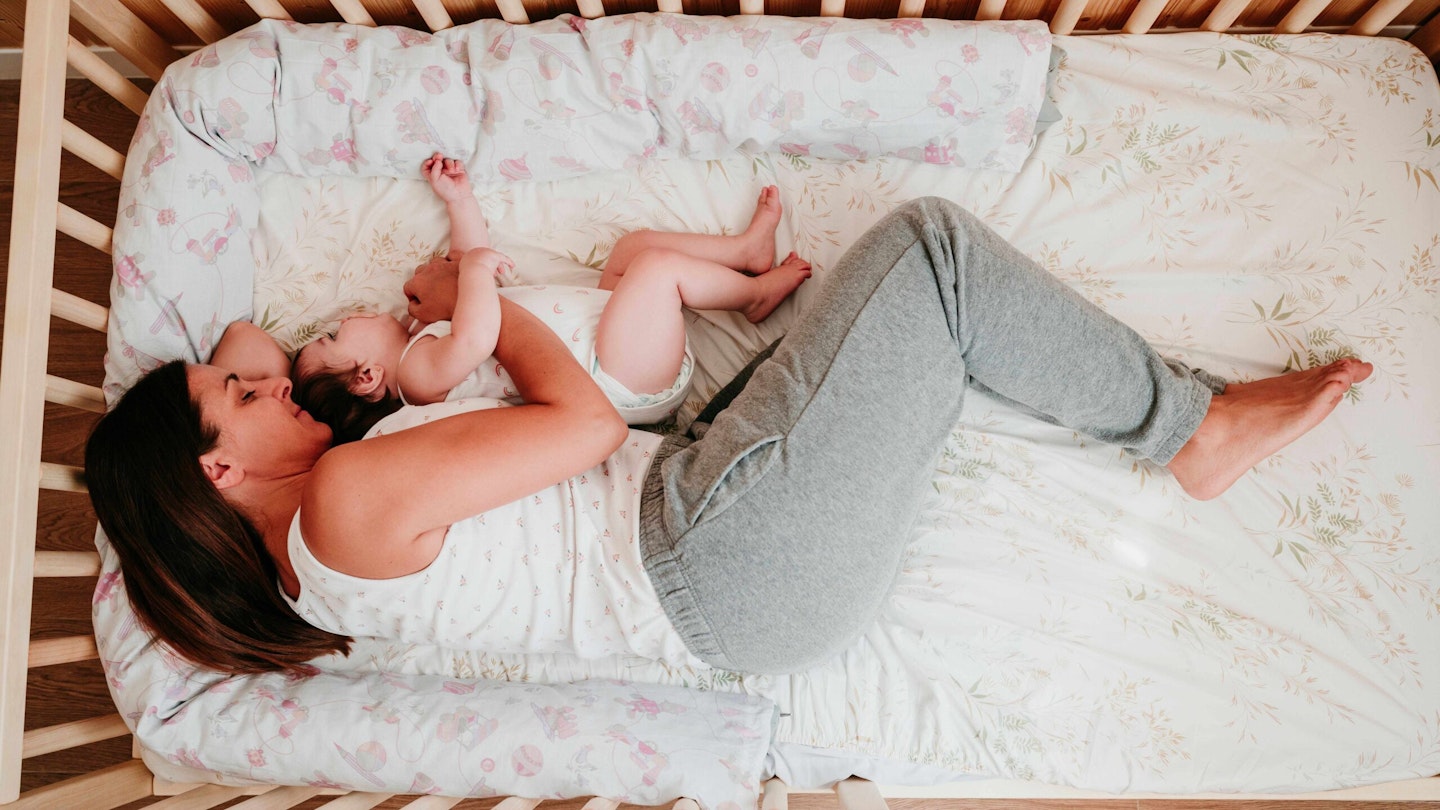When your little bundle of joy reaches the age of four months, you might notice they aren’t sleeping quite as much as they once were. Your previously snoozy little newborn is becoming more alert and interested in the world around them. They might seem to be more active these days and more sociable. Although it can be lovely as parents to start enjoying more interaction with our babies, this newfound interest in the world can also lead to reduced sleep, both during the day and at night.
You may have heard of the 4-month sleep regression, which can start around this time and make you feel like you’re back in the sleepless nights of the newborn days! Don’t fear, I’m Jo Smith, founder of Jo So Sleepy, a trained sleep expert who has helped countless parents and families with various sleep issues. I've provided you with some great advice and an easy-to-use sleep schedule to help send your little one off to the land of nod.

Should you start a sleep schedule at four months?
Four months is the perfect age to start a sleep schedule as some babies will start sleeping for longer periods at this age. This is a sample sleep schedule I’ve developed, every baby is different so you may want to tweak it slightly but this gives you a clear example of when and how long your 4-month-old baby should be sleeping within the space of 24 hours.
4-month baby sleep schedule

4-month-old sleep and feeding schedule
7.00am- Awake and feed (awake 1 hour)
8.00am - Wind down time
8.15am - Nap 1 (1 hour)
9.15am - Awake ( 1 hour 45 mins)
11.00am - Nap (1.5 hours)
12.30am - Awake and feed (1.5 hours)
2pm - Wind down time and too up feed
2.15pm - Nap (1.5 hours)
3.45pm - Awake and feed (1 hour 45 mins)
5.30pm - Nap (30 mins) This is a cat nap to ensure babies aren't too tired at bedtime but have enough sleep pressure for bedtime and overnight.
6.00pm - Feed
6.30pm – Bath and wind down
7pm- feed
7.30pm Bedtime
4-month-old baby sleep facts
• In total, 4-month-old babies need 14.5 hours of sleep over 24 hours.
• Naps should total around 4 to 5 hours a day
• Wake windows for babies aged 3-6 months are between 1.5 and 2.5 hours. Wake windows might still be short here for a 4-month-old; naps are more predictable towards 6 months.
• Sleep needs may vary, and remember this is just a guide; it's always best to go with your baby’s mood and energy.
What is the 4-month sleep regression**?**
Sleep regressions are common phases where a baby who previously slept well suddenly has trouble sleeping. If you’re lucky, your baby may have been previously sleeping well, then around about the 4-month milestone, they might start finding it harder to go to sleep, waking much more frequently, appearing more irritable, and not sleeping for as long a period as before. This isn’t really a ‘regression’ but is in fact due to developmental changes at this age and the transition to more mature sleep cycles, often causing disruptions in sleep patterns.
What are the common sleep mistakes parents can make at this age?
Parents can make several common sleep mistakes when it comes to routines for their children. Here are some key ones:
Inconsistent bedtimes: Not having a regular bedtime can confuse a child's internal clock, making it harder for them to fall asleep.
Skipping naps: For younger children, skipping naps can lead to overtiredness, making it more difficult for them to settle down at night.
Too much screen time before bed: Exposure to screens can interfere with the production of melatonin, the hormone that regulates sleep.
Creating a stimulating environment: Engaging in active play or loud activities right before bedtime can make it challenging for kids to wind down.
Poor sleep associations: Relying on methods like feeding or rocking to sleep can create habits that are hard to break as children grow older.
Neglecting sleep hygiene: Not keeping the sleep environment comfortable, dark, and quiet can disrupt sleep quality.
Ignoring signs of sleepiness: Waiting too long to put a child to bed can lead to them becoming overtired, making it harder for them to fall asleep.
Addressing these issues can help improve sleep quality for both parents and children.

What are the sleeping differences for breastfed and bottle-fed babies?
Feeding frequency:
Breastfed babies may wake more frequently at night, especially in the early months, because breast milk is digested faster than formula.
For bottle-fed babies, formula can be more filling, which may lead to longer stretches of sleep between feedings.
Nighttime feedings:
Breastfed: Some parents choose to nurse to sleep, which can create a sleep association that makes it harder for the baby to self-soothe.
Bottle-fed: If a baby is used to a bottle to fall asleep, the same potential sleep association can occur.
Satiation:
Breastfed babies: May feed more frequently, but may also be more adept at self-regulating their hunger.
Bottle-fed babies: Parents can track how much milk is consumed more easily, which might help in understanding the baby’s feeding needs.
Parental Involvement:
Breastfed: Nighttime feedings usually involve the breastfeeding parent, which can be more physically demanding.
Bottle-fed: Feeding can be shared between parents, allowing for more flexible nighttime routines.
Common sleep issues for babies aged 4 months
Short naps
Babies in this age range often have brief naps, sometimes lasting only 20–30 minutes. This can leave them overtired, as they miss out on the restorative benefits of longer naps.
Naps too long
Babies aged 4 to 10 months can sometimes nap too long, which can affect both their nighttime sleep and overall sleep balance.
Frequent night waking
Many babies wake several times during the night due to developmental changes, hunger, or a lack of self-soothing skills. Waking every 1–3 hours is not uncommon, which can disrupt their own and their parents' sleep.
Difficulty falling asleep independently
Babies in this age often struggle to fall asleep on their own and may rely on external factors like being rocked, fed, or held to settle. This can lead to sleep associations where they expect these same cues every time they wake up.
Early morning wakings
Waking up very early, such as 5am or 6am, is another common challenge. This can stem from bedtime timing, sleep environment issues (e.g. light or noise), or sleep pressure if they’re overtired.
Fussing or crying before sleep
Some babies fuss or cry when they’re placed down for sleep, signalling discomfort, overtiredness, or a desire for more soothing. The 4-month sleep regression is a notable phase where fussiness can peak as their sleep cycles mature.
Sleep regression
The 4- and 8-month marks are known for sleep regressions, where a baby’s developing brain and changing sleep needs can cause more night wakings, shorter naps, and fussier behaviour.
Teething Discomfort
Teething pain can disrupt sleep patterns, leading to more frequent wakings and difficulty in settling back down.

Top sleep tips for 4-month-old babies
Say goodbye to the swaddle
If you’re still swaddling your baby, start transitioning them out of this for safety reasons. Try placing a blanket over them or putting them into a Gro Bag where their arms can be free, but their bottom half still feels secure.
Encourage self-soothing
Many babies are used to being fed to sleep or rocked to sleep by their parents, and although this method may work well for both, it can lead to more frequent nighttime wakings. If your baby is unable to self-soothe, it will rely on your help to get it back to sleep. Rather than rushing in when you hear them wake, try leaving them for a few more minutes longer each time so they have the chance to soothe themselves back to sleep.
Spend time outside in the day in the light
Just like adults a daily dose of daylight helps to reset baby’s circadian rhythms. Try to get your baby out onto the natural daylight as early as possible in the morning and for at least 30 minutes each day.
Don’t neglect burping
When feeding your baby in the night it’s really tempting to pop them back into their cot when they're looking drowsy but if you’ve not winding them you may find they wake up about 30 mins later because they’re in discomfort. Winding them before putting them down will ensure a longer, and less disturbed sleep.
10 ways to create healthy sleep habits for babies aged 4 months
1. Create a consistent bedtime routine
Establishing a calming, predictable bedtime routine helps signal to your baby that sleep is coming. Simple activities like a warm bath, gentle massage, pyjamas, a lullaby, or reading can ease them into sleep - this shouldn't be too long, 45 minutes maximum.
2. Follow age-appropriate wake windows
Staying within these wake windows helps prevent overtiredness, which can lead to difficulty settling down and more night wakings.
3. Encourage independent sleep
Supporting your baby to fall asleep independently can make a big difference in their sleep habits. When they can self-soothe to sleep, they are more likely to settle back down independently when they wake at night. This could mean putting them down drowsy but awake and giving them a few minutes to try to settle on their own.
4. Darken the room for naps and nighttime sleep
A dark room can help your baby sleep longer, as it encourages the release of melatonin, a sleep hormone. Blackout curtains or shades can be useful for blocking out light, especially during the longer days.
5. Avoid overstimulation before bed
Keep things calm before naps and bedtime to help babies wind down. Overstimulation—such as loud noises, active play, or screen time—too close to bedtime can make it harder for babies to fall asleep.
6. Cap naps to protect night sleep
Limiting individual naps to be age-appropriate can help ensure your baby is sleepy enough at bedtime and doesn’t start to mix up day and night. Total daytime sleep figures should be considered.
7. Be responsive, but give baby a chance to settle
When your baby stirs or cries at night, wait a few moments to see if they resettle on their own. Sometimes, babies will fuss lightly before drifting back to sleep. If they continue to cry, check on them and offer gentle comfort to help them feel secure.
8. Address any discomfort or hunger
Ensure that your baby is comfortable and well-fed before bedtime. Teething, hunger, or other discomforts can disrupt sleep. Babies in this age range may still need one or two night feeds, so be mindful of hunger cues.
9. Adjust as needed during sleep regressions
Around 4 and 8 months, babies go through developmental changes that can temporarily disrupt sleep. Stay consistent with routines, but understand that these phases are normal and often pass on their own within a few weeks.
Implementing these tips consistently can promote better sleep patterns and help your baby develop a healthy relationship with sleep as they grow.
About the expert
Founder of Jo So Sleepy, Jo Smith, is a certified sleep coach and a proud mum of three wonderful girls. Her journey into sleep coaching began from her own experience as a sleep-deprived mother, navigating the challenges of sleepless nights and the quest for restful sleep. After using a sleep coach herself, which she found to be life-changing, she recognised the profound impact that proper sleep support can have on families.
